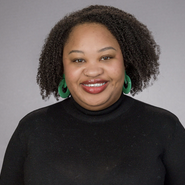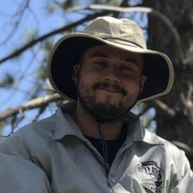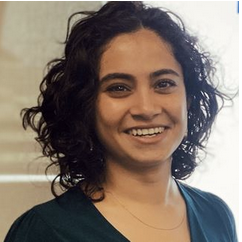The journey toward clean, sustainable energy (energy justice) and infrastructure that prioritizes community needs and health (infrastructure justice) are ongoing. However, there is a persistent concern that some communities may once again be excluded from the benefits or the decision-making process in developing these solutions. Too often, these solutions fail to serve people equitably across different income levels, races, ethnicities, and religions.
This webinar provided diverse perspectives on how research and community engagement can drive equitable environmental solutions for energy and infrastructure justice. The webinar will bring together three current fellows of the Agents of Change in Environmental Justice (AOC-EJ) program, Mokshda Kaul, Dr. Greer Hamilton, and Jose Ramon Becerra Vera. It was moderated by Dr. Max Aung and Dr. Lariah Edwards, senior fellows and Assistant Directors of AOC-EJ.
Mokshda Kaul will discuss her interdisciplinary research on clean energy transition policies, focusing on energy and environmental justice implications. She will also discuss her stakeholder-related work on deploying clean energy technologies in coal-affected communities in Arizona and organizational barriers to incorporating energy and environmental justice in federal energy programs.
Greer Hamilton will discuss her work with community organizations to develop mitigation strategies for transportation-related air pollution in greater Boston. She will also discuss her work on the integration of arts-based methods to address personal and community experiences related to environmental justice.
Jose Ramon Becerra Vera will discuss his work collecting data in collaboration with community scientists in Southern California, examining uneven exposure to wildfire smoke and pollution from vehicle transportation among warehouses. He will discuss his work to further environmental justice by democratizing science.
Featured Speakers

Greer Hamilton, PhD (she/her) is an assistant professor at the University of Michigan School of Social Work. As a place-based researcher, her work seeks to examine how systems of oppression are embedded into the built environment and subsequently impact people’s health, well-being and use of public spaces. Her work often uses community-engaged, arts-based and embodied approaches to understand study participants’ experiences with places of meaning (e.g., neighborhoods). In the School of Social Work, she co-coordinates the Community Scholars Program (Community Based Initiative in Detroit and the National Community Scholars Program). She also serves as an advisor for the forthcoming Roots of Reproductive Justice Timeline and a board member to Midwest Access Coalition, a practical support abortion fund serving people in and traveling to the Midwest.

Jose Ramon Becerra Vera is a PhD candidate in the Department of Anthropology at Purdue University, working in the Farmer Learning, Agriculture, Culture, Humanities, and Social science laboratory. He specializes in the political ecology of pollution, uneven exposure, and environmental and climate justice. Currently a National Geographic Explorer, he collects dissertation field data with community scientists in Southern California’s Inland Empire, examining uneven exposure to wildfire smoke and logistics transportation pollution. Through his community-centered data collection and analysis, unmasking the drivers of uneven pollution exposure, his work aims to democratize science and contribute to local and global fights for environmental and climate justice.›

Mokshda Kaul received her master’s and bachelor’s degree in economics from Mumbai University in India. Currently, she is a PhD candidate in the Sustainable Energy program at the School of Sustainability at Arizona State University. Her research interests lies in the justice and equity implications of the clean energy transition. As a part of her PhD dissertation, her research focuses on how policies that are furthering the clean energy transition are addressing energy and environmental justice. Outside of her dissertation research, her recent projects have dealt with the deployment of clean energy in coal-impacted communities within Arizona and understanding organizational barriers to incorporating energy and environmental justice in the portfolio of the Department of Energy’s Water Power Technologies Office.
CHE partners with Agents of Change and the Center for Environmental Health and Justice in Northern Manhattan at Columbia University to host this ongoing series featuring the stories, analyses and perspectives of next generation environmental health leaders who come from historically under-represented backgrounds in science and academia. To learn more about AOC-EJ, read the blogs, or apply for the fellowship, go to https://agentsofchangeinej.org/.
